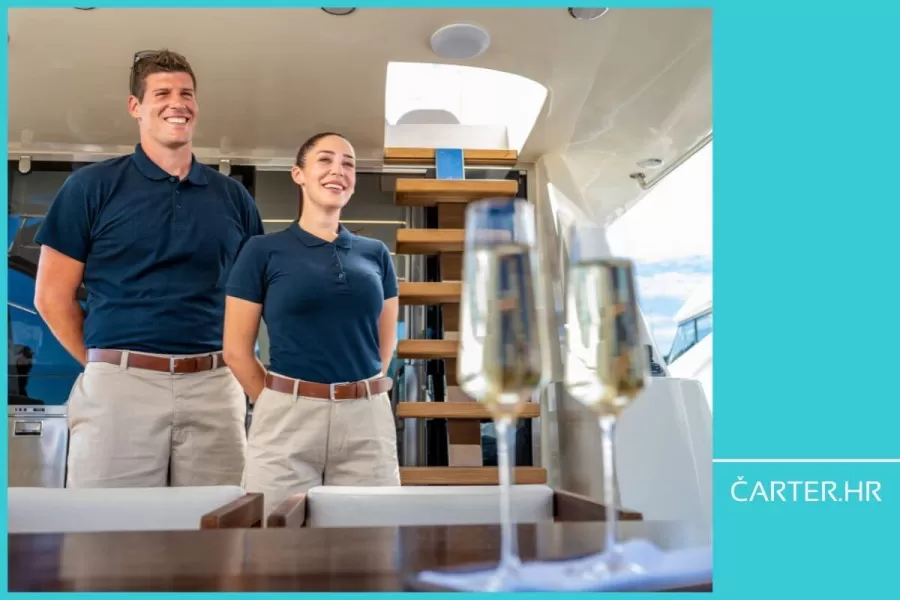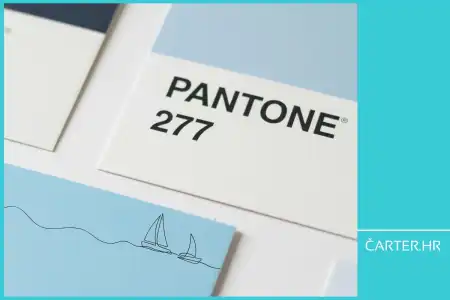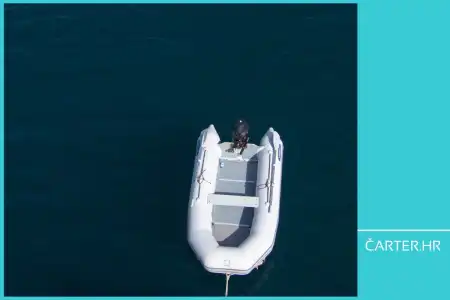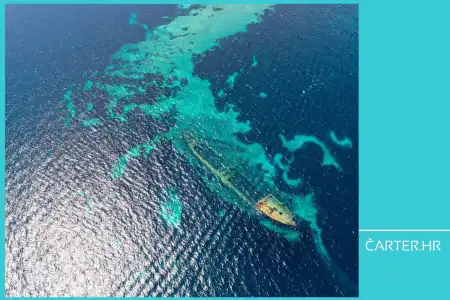
- 20.02.2024.
- News, Management
Most of the fleet in Croatia is bareboat charter - vessels that are rented without a crew, and the guests manage them themselves. Nevertheless, a growing trend in the number of crewed boat rental offers can be observed more and more. On crewed vessels, guests' "only job" is to enjoy and relax while crew members attend to most of their needs. Who is the charter crew, and what challenges do they face?
Overall impression of the yacht charter company will depend on the crew - skippers, hostesses, chefs - and the quality of their engagement while on board the vessel. They are in direct communication with the guests, and ultimately, the crew represents the entire yacht charter industry to the guests.
The question of crew in Croatian yacht charter is a "burning" issue from season to season. There is always a need for more crew, especially quality and educated crew.
But what qualifications are required for each role on a vessel, where can you find quality crew, and where can yacht charter crew find work?
And finally, let's find out what challenges the yacht charter crew can expect in the workplace.
The problem of seasonality in the yacht charter
In Croatian tourism, including nautical tourism, there has been a labour shortage for some time. Seasonality, which is typical for this sector, can most often be cited as the cause of this problem.
People looking for secure and permanent employment avoid these jobs, which are temporary and depend on the length of the period in which there are guests.
The degree of seasonality is not the same everywhere. It also depends on the tourist offer that is provided at a particular destination.
Companies that find an adequate solution to combat seasonality can extend the season as much as possible. They can even increase the attractiveness of destinations throughout the year, so it is not a lost battle for those interested in yacht charter business.
Mediterranean countries, including Croatia, have much to offer regarding cultural and historical heritage. Therefore, it is the right time that we get out of the usual pattern that only the sun and the sea are enough for tourists.
Solving the problem of seasonality is one of the strategic goals of Croatian tourism, and it can be achieved by improving existing tourist products. It can also be achieved through the development of new and innovative products.
Such creative offers, which would provide guests with a quality and meaningful tourist experience, will attract them to stay on the Adriatic coast even outside the main tourist season.
And where there are guests, there are jobs...

Skippers – professionals at the helm
The most important member of the crew, for those guests who do not know how to sail independently, is undoubtedly the skipper.
The task of every skipper is, in short, to manage the vessel and look after its passengers.
The skipper is the person on board who assumes the most significant responsibility during navigation.
The safety of both passengers and the boat itself depends on his ability and attention.
If a situation occurs where the yacht charter company loses the boat for some reason, it is the skipper who is held responsible.
Therefore, it is imperative to carefully study and master the qualifications required for the job of skipper and be sure to pay attention to what conditions are agreed to in the yacht charter contract.
As for specific examples, the following qualifications are desirable for the job of skipper:
- Familiarity with the basics of yacht charter business
- Knowledge of the vessel's mechanics and electronics
- Seamanship skills
- Knowledge of boat safety
- Knowledge of the sailing area
- Knowledge of several foreign languages
- Communicativeness and patience
- Care and protection of the marine environment
Familiarity with the basics of yacht charter business - the more knowledge a skipper has about the nautical tourism industry, the more desirable the candidate for the job. The skipper is expected to know the types of vessels and their characteristics, to be familiar with the charter's organisational structure and check-in/check-out procedures, and to be able to check the ship's documentation and make a crew list.
Knowledge of ship mechanics and electronics - in addition to familiarity with electronic devices and other control system parts, the skipper should know all further details of ship management and maintenance, such as anchors, sails, drinking and wastewater systems, polishing, etc.
Seamanship skills - seamanship skills primarily mean knowledge of manoeuvring, external conditions (wind, waves, currents), handling of ropes and knots, tying the vessel, securing the vessel, etc.
Knowledge of safety on the vessel - the skipper presents the guests with someone who can take care of them in case of unexpected danger. Thus, the skipper must know about life jackets, fire extinguishers, and lifeboats. The skipper should also know first aid, communicate by radio and know the meaning of the signal code.
Knowledge of the sailing area - the skipper becomes irreplaceable when he is well acquainted with notable sailing routes and knows where, for example, hidden bays are located that will delight guests. It is also useful when the skipper is educated about the cultural heritage of the destination he is taking guests to, where he can serve as an invaluable guide and give them more than what they expected to get on vacation.
Knowledge of several foreign languages - we don't think we need to explain further why, in tourism, knowing as many foreign languages as possible is a highly desirable skill!
Communicativeness and patience - the skippers communicate directly with the yacht charter guests, so their communication skills are critical to maintaining high safety and guest satisfaction.
Care and protection of the marine environment - and finally, in addition to caring for the vessel and its guests, the skipper should also care for the marine environment. Care should be taken to prevent pollution, be it minor or significant, and know what to do if it does happen.

Hostess on board a yacht charter vessel
A hostess on a ship would correspond in terms of her duties to a stewardess on an aeroplane.
The role of the hostess is to welcome guests, give them basic instructions for safety and comfortable sailing, and ensure their enjoyment during their stay on board.
Some typical jobs that hostesses perform on ships are:
- Welcoming guests
- Negotiating the menu with the guests (if necessary, the procurement of food and drinks within the budget)
- Meal preparation (following instructions on dietary restrictions of guests)
- Maintenance of the ship's interior and cabins
- Helping the skipper as needed (docking, anchoring, leaving the port, etc.)
The hostess does not need to be available to guests 24/7 to entertain them and look after their children. Still, it is desirable that guests feel cared for and comfortable with her.
A quality hostess on board should have the following skills and qualifications as well developed as possible:
- Knowledge of VHF radio communication
- Knowledge of handling auxiliary boats
- Possession of a minimum license for the leader of a category B boat
- Speaking as many foreign languages as possible, especially English
- Organisation skills
- Communicativeness and patience in working with people
- Discretion and unobtrusiveness
- Eye for details and interior decoration
- Culinary skills, especially if there is no chef on board
- Information about the sailing area
Hostesses with additional training and specialisation can easily become...

Chef - the creator of the magic of flavours on board
In nautical tourism, being a chef on a yacht is a prestigious dream job. At the same time, the chef is one of the most valued members of the crew.
The chefs are capable of preparing simple but high-quality dishes for the guests with their skills within the limits of the budget and space they have at their disposal. This completes guest's vacation and gives them an additional source of pleasure and an opportunity to bond with friends and family around the table.
Being a chef on a yacht is more challenging than in a restaurant or hotel – on a boat, everything depends on the chef, who bears full responsibility for the guests' meals.
You have to make do with what you have in a very small space with limited tools, without additional help. To achieve this, a chef must know how to plan and time everything from preparation to serving the meal well.
On the other hand, a chef's job in a yacht charter brings mobility, being at sea and fresh air, and the opportunity to gather business or private contacts.

Employment of yacht charter crew
Although Croatia is one of the best nautical destinations in the world, there is still a shortage of yacht charter crew members.
Educated and quality workers are those who increase the satisfaction of guests and the success of the yacht charter companies they work for, and thus, the popularity of nautical tourism in Croatia in general.
Seazone is a platform whose purpose is to transform employment in the nautical industry, as it provides a simple solution for connecting yacht charter companies and crew.
Seazone offers a personalised dashboard through its platform that allows yacht charter companies to find and hire qualified crew tailored to their specific needs.
On the other hand, individuals looking for a job in the nautical sector can use Seazone to research open positions and apply for jobs that match their skills and experience.
The platform is also designed to simplify daily operations, not just as a platform for connecting and recruiting. It integrates tools for digital management, enables overview of yacht costs, document organization, and charter fleet management.
Seazone makes recruitment more efficient and accessible, connecting the global yacht charter industry with a ready-to-work crew.
If you want to know more about the Seazone platform, contact us, and we will be happy to provide you with additional information.
Follow us on our social networks, Facebook, Instagram, and LinkedIn, to stay updated with nautical news.
Categories of trends
- News
- Sale
- Marketing
- SEO
- Web design
- Social media
- Technology
- Regulations
- Management
- Education
- Finances
- User experience
Newsletter
Sign up for the newsletter and receive the latest trends and tips straight to your inbox



